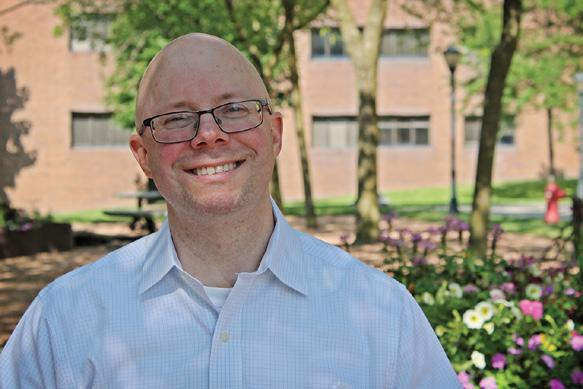
12 minute read
The evolving CPA profession
From flex time to high-tech tools, firms are taking steps to make accounting careers more attractive and fulfilling.
Some Wisconsin accounting firms are adopting more employee-friendly policies and integrating high-tech tools to combat perceptions that the profession is demanding and stressful due to long hours, poor worklife balance and insufficient job flexibility. At the same time, some colleges are working more closely than ever with accounting students to ensure they’re taking courses as efficiently as possible in order to minimize the costs of fulfilling the 150-hour requirement for taking the CPA exam. Industry observers believe that workplace concerns coupled with the higher costs associated with the 150-hour coursework requirement have contributed to recent drops in exam
By Ken Wysocky
candidates and accounting graduates, as well as a decrease in enrollees in bachelor’s and master’s programs for accounting. According to the 2019 Trends report, published by the Association of International Certified Professional Accountants (AICPA), candidates for the CPA Exam decreased 7% between 2017 and 2018, the latest years for which figures are available (partly explained by the adoption of a new CPA Exam effective in April 2017). And during the same time period, the number of CPA Exam candidates who passed the fourth section of the exam dropped 6%. Furthermore, projected accounting graduates in the 2017–18 academic year were 4% lower at the bachelor’s and
master’s levels and overall; and enrollees in bachelor-level accounting programs in 2017–18 dropped to 207,806, 1 a 4% drop compared to the 2015–16 academic year. (Data from the 2016–17 academic year were absent from the report.)
During the same period, enrollees in accounting-related master-level programs dipped to 27,482 — a nearly 7% drop. That pushed the level of accounting-related master’s degrees to the lowest level since the 2009–10 academic year, AICPA statistics show.
New recruiting approaches
David Gay, CPA, managing partner at the Milwaukee office of Ernst & Young LLP and an accountant for 24 years, disagrees with the perception that accounting careers are too demanding to attract college students. “At one time that may have been a fair representation, but now it’s a stereotype that the profession hasn’t been able to debunk,” he said. Nonetheless, Ernst & Young has taken steps to engage both prospective and existing employees in different ways. On the recruiting level, recruiters talk more about business processes in public accounting than the nuts and bolts of debits, credits and financial statements, he explained. That means emphasizing things like the chance to talk to senior executives at companies to explain the “why” behind their financial results as well as opportunities for personal and professional development, upward mobility and travel, he noted. “We tell them that they’re going to get to see how multiple businesses operate and be able to compare and contrast them,” Gay said. “They’ll also be in the room with senior executives at a very young age.” Huberty CPAs also has changed its recruiting approach during campus visits, said Nathan Volkomener, CPA, a managing shareholder at the firm’s Plymouth office. Because competition for talent is keen, the firm felt compelled to update how it talks about its services and the company. During the past several years, Huberty has transitioned from talking to students about open positions to articulating a story about the company — creating a brand awareness that emphasizes all the new skill sets required compared to a traditional firm. “We don’t fit in that box anymore,” Volkomener said. “We prefer to call ourselves a CPA-led professional services firm. We find that students are more interested in a story than a position. We also don’t call [entry-level] employees staff accountants. We
Nathan Volkomener, CPA David Gay, CPA
call them consultants, which speaks more to our approach of not being in a conventional box.” To reinforce that accounting these days is more than just getting numbers to foot, the company also emphasizes that it wants people with analytical, planning and strategic skills in addition to basic accounting skills, he added.
Career, quality-of-life enhancements
After recruits are on board, Ernst & Young offers an array of benefits aimed at making accounting a more user- and family-friendly career. For starters, the company is “laserfocused” on broadening employee skills, especially in the area of digital technologies. “We’re also all about accelerating and personalizing their career paths, including regular career conversations,” Gay said. “We want to make sure we’re working together toward the bigger picture, as well as making them comfortable and helping them develop a greater sense of belonging, which also manifests itself in inclusion and diversity efforts.” In terms of boosting work-life balance, the company also offers winter and summer breaks, in which it actually closes down for one week at the end of each calendar year and for one week over the Fourth of July holiday. Employees also get four-day weekends for the Memorial Day and Labor Day holidays, he said. Conscious about the increasing demands employees face between work and home, the company has empowered teams to develop their own flexible work schedules. It also provides technologies that support working remotely, such as videoconferencing capability or a phone app that allows accountants doing in-the-field inventory work to scan and upload data directly into company software systems. “It’s just a more efficient way for employees to capture that information versus the old way of taking notes with paper and pen or by computer,” Gay said. Employees receive 16 weeks of extended maternity or paternity leave, and the company also reimburses employees for 75% of gym memberships to support physical well-being. Realizing that millennials also want to be part of something bigger than themselves, the company staunchly supports employee volunteerism. It holds an annual day of volunteer service, called EY Connect Day, when all employees do volunteer work, he said. “We’ve focused a lot on these issues over the last decade,” he noted. “One way we’re able to do this is by constantly seeking feedback from employees.” Are older employees — baby boomers, for instance — resentful that all these policies weren’t available to them earlier in their careers? “That’s a fair question,” Gay said. “But I don’t
feel like there’s a level of resentment toward a younger cohort getting benefits an older cohort didn’t get. Instead, there’s a sense of pride about the fact that we’re willing to invest in all of our people and obtain the best possible talent.”
Flexible schedules
At Huberty, millennials are represented in the shareholder group. As such, Volkomener said, the company already has a different perspective than some accounting firms about how to better connect with the next generation of talent: Gen-Z employees, loosely defined as people born between 1995 and 2010. One big employee benefit is alternative work arrangements. Here’s how it works: Employees are eligible to work two days a week remotely. In addition, they can create their own 40-hour-aweek flexible schedules to accommodate their family dynamics. “Virtually anything is on the table,” Volkomener said. As examples, he cites working four 10-hour days or working 8-hour days Monday through Thursday and on Saturday. However, during tax season from January 1 to April 15, employees are expected to work 55 to 60 hours a week. But flexible scheduling still remains an option. “How you get to those 55 or 60 hours a week is entirely your own choice,” he said. Employees then get a breather during a 15-week period in summer when they work only 36 hours a week, courtesy of halfday Fridays, he added. To meet younger employees’ demands for better transparency and more communication, the company also does more internal communications regarding big-picture, long-term strategies. “We now present annual three- to five-year strategic plans, which we never did before,” Volkomener noted. “We also hold a staff retreat every year during which we roll out strategic initiatives and take a deeper dive into long-term strategies. Younger employees want to know how they fit in and where the company is going,” he said.
High-tech approach
To address younger employees’ desire for all things technological, Huberty has developed new products, such as virtual bookkeeping and data-analytics platforms that require users to possess new and different skill sets. “We’re working with large data sets to solve problems, which is a lot different than what we’ve done in the past,” Volkomener explained. “These kinds of investments show we’re committed to staying relevant. Technology is critical to how you show up and attract talent.” To dispel the notion that accounting firms are hidebound and resistant to change, Huberty also continues to examine how work will change in the future. The upshot? More investments in improving accounting tools and integrating new technologies into existing processes.

As examples, he cites cloud infrastructure, machine learning/ artificial intelligence and optical character reading (OCR) textrecognition software. The latter eliminates the need to handkey data into software, a time-saving technology that allows employees to focus on more important tasks that better benefit clients. “It’s essentially automated data collection,” he noted.
New education strategies
On the other end of the issue, colleges and universities continue to strive to help students reach the magic 150-hour credit level as efficiently and cost-effectively as possible. Schools also encourage students to pair their accounting major with an accounting-related major, which can make them more attractive to potential employers. In other words, if students must be in school for five years, they should earn second majors that will bolster their accounting bona fides. At the University of Wisconsin–Eau Claire, where the number of accounting majors has stayed fairly constant for the last seven academic years, officials encourage students to take the CPA Exam as soon as they meet the requirements, said accounting professor DeeAnne Peterson, CPA, MBA. Many states — including Wisconsin — allow students to take the exam after completing 120 hours of coursework but require 150 hours to become fully licensed as CPAs. Underway for some time, that effort subsequently led faculty to integrate CPA Exam material into upper-level courses. The result? Students are taught at a level comparable to the CPA Exam, which enhances their ability to take the exam while still in school.
DeeAnne Peterson, CPA, MBA

Peterson said that in order to meet the 150-hour requirement, the school encourages students to pursue a double major — in accounting and finance, for example, or perhaps accounting and information systems — or to simply add a minor in addition to an accounting major. “So if we can set up their classes the right way, they have the time they need and the required courses in place to take the exam here during their fifth year,” Peterson said. “But we work hard to get them finished in 4½ years. We’d rather do that than have them spend time after graduation [to finish] or do it while they’re working 40-plus hours a week at a new job.” Kevin Rich, CPA, PhD, chair and associate professor of accounting at Marquette University, also strongly supports carrying double majors on the way to earning 150 credit hours. “I advocate for a double major in accounting and information systems,” he said. “To me, they go together like milk and cookies.” To better mesh with new trends in the accounting field, Marquette recently started emphasizing more technology in its accounting curriculum. The school currently offers accounting analytics and fraud analytics courses and will add an audit analytics course in fall 2020, he said. “These courses teach thought processes that will prepare students for the jobs of tomorrow, taking advantage of big data and tools to improve efficiency, plus coverage of the kinds of audits that firms engage in,” said Rich. “I’d argue that when students get jobs, they’ll be able to hit the ground running in ways they otherwise couldn’t without these courses. “And we know it’s relevant material because we relied on guidance from accounting firms to inform what we teach,” he added.
Kevin Rich, CPA, PhD

150 hours too high a bar?
Now in place nationwide for roughly two decades, the 150-hour requirement remains a topic of debate. Proponents contend the additional education strengthens students’ competency and better prepares them — not only for the CPA Exam but for their careers. Opponents contend the 150-hour requirement makes less sense in the wake of ever-rising tuition costs and burgeoning student debt. They also note that the presumption students would compile the extra hours by completing graduate degrees has not played out as expected. Why? Some studies show that entry-level salaries for accountants don’t vary significantly between those with undergraduate and graduate degrees. As such, there’s no real economic incentive for students to meet the 150-hour requirement by taking graduatelevel courses, which typically cost more than undergraduate courses, observers contend. All this raises a thought-provoking question: Does the 150-hour requirement add value to becoming a CPA? Rich contends it does, noting that the requirement was changed 20 years ago specifically to add value. “It’s been in effect long enough to be a known commodity, and a lot of our students will still try to graduate in four years by taking advancedplacement credits and attending summer school.” But Rich concedes the standard is a double-edged sword. On one hand, it deters some students from pursuing accounting degrees. On the other hand, it ensures that students who want to become accountants are fully committed. “I’m sure the creators of the rule never thought that this question would be asked,” he added. “Quite frankly, we never worried about it because accounting has always been a very compelling career path. “Furthermore, the skill sets required of today’s accountants are much more complex than what’s required by the CPA Exam,” he noted. “So students greatly benefit from using those extra required credits to develop technology and software skills.” The downside is that nothing mandates what those 30 extra hours of coursework must include. As such, students don’t always take classes that will better position them to pass the exam and have successful careers. So the value of that extra coursework completely depends on how constructively students use it, Rich said. “That’s why we encourage them to marry degrees that give them more opportunities when they leave here,” said Peterson. “It gives them that much more expertise, which is an advantage over earning just an accounting degree. It opens more doors and opportunities.”
Ken Wysocky is a freelance writer based in Whitefish Bay. Contact him at 414-962-6202 or kenwysocky@gmail.com





